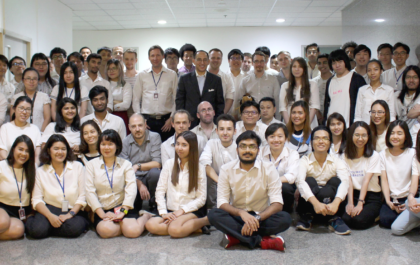It is often said that success is opportunity meeting preparedness, and while brothers Rachvin and Kulthep were totally unprepared for the opportunity that came knocking loudly on their door, they answered the call by working their backsides off, riding that opportunity wave all the way to success.
In the fast-changing landscape of the film industry, they have time and again read the trends correctly, adapting and pivoting, expanding into new territory and gaining market share. Today Benetone Films is one of the best-known producers in Thailand making projects possible for filmmakers and advertisers from all around the world.
An interview with great stories and usable advice for both, new and experienced entrepreneurs.
Enjoy!
Genup: Tell us about yourself.
Kulthep: I started off in Thailand till about Grade Five, Grade Six, and then went to India. I went to Scindia School, in Gwalior. Seven to 12. Then came back. I went to Assumption University here in Thailand and then transferred to NYU for the two years. India was good, India was great. I was like, I think most of the people hated going to India in the beginning, but after a year or two, you really start enjoying yourself. Pretty much only Thai guy in the school. At NYU, I did finance and accounting. And I just chose New York because it was just a fancy degree. And I visited other places and I guess, I liked New York more. It was fun. New York was really good back then. So, spent two very good years there. Studied, partied, did everything under the sun.
Rachvin: After starting here in Thailand, I went to India too, to Mussoorie. I was in 6th grade. And then came back and went to Assumption University for a couple of years and then transferred to GW, George Washington University. I did my Bachelor’s in Business and then it was quite easy to accelerate and finish an MBA in a year. I figured I might as well just finish it. Hindsight, it was not really useful to do an MBA, right after without the work experience. So isn’t really useful. After that, I went to Bombay, India for a year. I was working in a chemical plant there. And then came back and joined Imperial Chemicals as a Finance Director. Because I was always finance in Imperial Industrial Chemicals.
Genup: Why did you decide to do your own business?
Kulthep: Our family has always been in business, so it was always natural that we were going to do it in some form or the other. And when I graduated undergrad from NYU, I got a job at Citibank, but then with the whole family doing business here, plus a lot of business opportunities that came along, so I decided to come back here. It’s in the blood.
Genup: Is this your first business?
Rachvin: No, not at all. There were a few transformations. I worked for Imperial Chemicals as Finance Director and then President and then we sold the shares. I then moved back to our core family business. After that we started Cyberia which was at the time the first internet Cafe in Thailand and probably in Asia. Cyberia also did web development and was the pioneer in internet services in Thailand. We went through a lot of crises during that time with the Thai Financial crash, what was called the Tom Yum Kung crisis and then the US tech internet crash, we finally decided to close Cyberia and move on.
Genup: Talk to us about Benetone Films.
Kulthep: It was a chance meeting at the right place, at the right time, with the right person. You know when you talk about life taking a turn, you know clearly where it did. This is one of those, a big moment for us. It was not a business that we knew anything about, at all, and started with Dad, who happened to be in India at a function, where he met Feroz Khan. It was this chance meeting through his common friend. And so, they met by chance and started talking, and somehow, they really clicked, and they got along really well. And so, Feroz was actually going to shoot a movie in Australia.
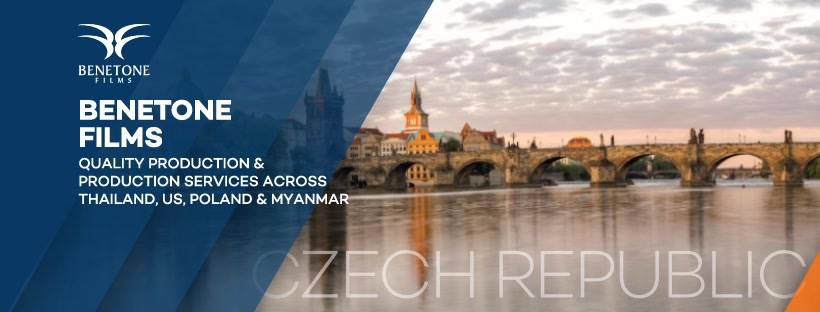
Genup: Who is Feroz Khan?
Rachvin: Feroz Khan for people I guess, he was an actor, very big one. I mean compared to someone in Hollywood he would probably be like Robert de Niro or Clint Eastwood. In the sense that he was a very big star, and a producer and director. He did everything. He also has his own film company.
Anyway, so, he said, he was going to shoot a movie and launch his son, Fardeen, in that movie. And he was going to go to Australia to shoot that movie. And then he told my dad that he’d never been to Thailand and now that he knew my dad, he wanted to come over and shoot one song at a night club here. That would be the title song, and after which he would go on to Australia and shoot the rest of the movie.
Kulthep: Yeah, so he said, “I want to come, do one song and I’ll get the dancers from India. I’ll do this one big song, and then I’ll go to Australia.”
So, my Dad’s like, “Yeah, sure, you know, come by”. So Dad came back here and he told us about it, and we were like, “Seriously? Like, what the fuck?” What are we supposed to do? We know nothing about that, and what is this? So, he’s like, “I don’t know, just figure it out. I told Feroz Khan that we’d help him do something.”
And then we quickly figured out. We found out that there is an agency that we’ve got to apply before filming. We went, we met them, and spoke to them, and then we quickly figured out the basics of what we had to do, that it’s actually a business of logistics. With creativity in it. But early on, we figured out it’s just logistics and planning and management.
And then Feroz came to Bangkok to scout. And when he came, he and Dad went around for many weeks, around Thailand. At that time, I was still young. That was 20 years ago, and Feroz went around the country he actually fell in love with Thailand and decided that he was going to shoot the entire movie here.
Except for one scene that needed car racing, he would that one in Australia. But everything else, he wanted to shoot it here.
It was simply because Dad was being a good host and friend and they had a nice holiday together. Feroz enjoyed it, and when he came to us, he said, “Can you do this? And can you get this?” And every time, we were able to find things for him. I mean, we did hire a local co-ordinator but we were worked and became the people who was actually managing and finding things and putting them together for him. And we had a bit of management skills, so we began to figure things out.
We shot for 60 days, with a crew of almost 170 people and we learned on the job. The film office was very surprised that so many people came. They’ve never seen such a huge crew. We flew in like 35 or 50 dancers.
It was crazy, we didn’t know what a camera was, what lights were, what is a call sheet. Nothing. But we were lucky in a way because Feroz was also old school, so he would show up at ten o’clock and by four o’clock he was like, “Fuck, I’m tired, let’s go home.” So then we learnt and we did it, and we didn’t think too much of it after and we just went back to our normal lives. And then six months later, somebody else came and said, “Hey, listen, I heard you did this movie, and you guys are Indians, based here.” And they were actually going to shoot with another company, another Thai company.
And then they came and met up with us. Got along. We’re still friends with that guy today. We meet him at all the film festivals, and he keeps coming over to Thailand. And so, he got the second movie for us, and we’re like, okay, wait now we’re getting the hang of this. And we did another 30 days of shoot. And then after that, again, after a couple of months, somebody else came, and this was a big production. The film was a big company. But we told them as well, “Look guys, this is not really our business. We don’t do this.”
Rachvin: Yeah, we told them, “Look guys, this is not our business. Last time, we did it as a favor for a friend” They said, “No, no, you guys did a great job. And so, then we had to figure out how do we charge? We don’t even know how to make money out of it.” We didn’t know there was a business model. But we thought, okay, people are willing to pay for it and so we quickly found out how to charge. What the kind of charges are, to record it for them. After the shooting was over, the guy told us that we were less than half the price of the others.
“So, you guys are half the price of what the other guys are.” We said, “Okay, we didn’t know that.” At that time India was starting to go overseas a lot to shoot. But before we came in, there was already advertising business that was coming to Thailand from India to shoot. Long time before we went into this business, there was advertising business coming, which we knew nothing about.
Kulthep: So, there were a couple of other people doing it before we came in. There were a couple of Indians who came here and set up shop and they were doing it.
Rachvin: I believe Thai companies, too. They were doing production; they were doing post-production in Thailand. Thailand’s very famous for post-production.
Kulthep: The late ’80s, early ’90s… ’90s was when Indian advertising kind of took off, but their infrastructure was very weak, and Thailand had a better infrastructure back then. So that’s why they were coming and doing it here, especially post-production was very good in Thailand back then. So the business started coming to us, but then Europe was very unaffordable to most of the people. And then Thailand just became the next big country for Indian films to shoot, because they couldn’t afford to go to Europe. And Eastern Europe was not open back, it was all shut, and Western Europe was just way too expensive.
Yeah, so Thailand… Infrastructure was good, easy to get here, cheaper. All that played into the factor of proliferation of the Indian film shoots coming to Thailand.
Rachvin: I think we were very lucky. We were just at the right place at the right time. And while it obviously it started with that, we worked hard at it. But luck also played a big role. It was still the time that it was booming. It was the time that foreign production was becoming very big in India because they wanted in. For them, they get better value if they go out and shoot, and Thailand was the easiest place to go out and shoot.
We did like 8 films around that time. There was also Dharma Productions, a big company and they gave us some tough projects.
Rachvin: That was very tough. That was the one we had to import tigers into the country.
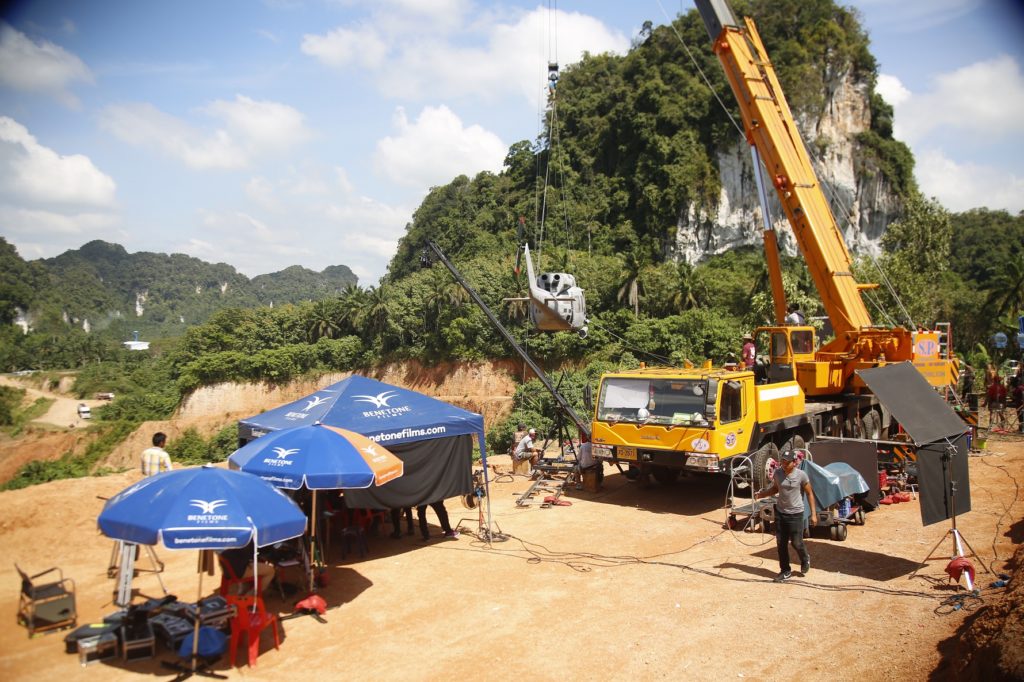
Genup: So now, what does Benetone Films do, what is your core concept?
Kulthep: When we started the business, it was what we call “production services.” That’s the term that we use in the industry. Which means that you handle the entire shoot logistics for people coming in. So what we do is, the A to Z of production. Whatever needs to happen in the setting of the film. They may say, “We need to shoot this.” And they’ll come to us and then we have to line up everything for them. Everything from the permits, to dealing with the government agencies, to handling their entire shoot requirements. The whole accommodation, travel and all that stuff. And also handling their films and sometimes post-production depending on what they need.
So we do their entire shoot logistics for them. For both, for films and TV commercials. So we do all different types of production. We do reality shows, TV shows. Documentary is also launched within a very small scale. But mostly focusing on films and advertising.
Rachvin: There’s a range for production services. People use it as a general term. On one end of the spectrum are the coordinators, on the other end is the line producers.
We are generally line producers. So basically for us it’s like, this is the project and we are now running it. When we started off we were mostly production service but now we’ve reached a stage where we are actually, the project comes to us and we’re really getting involved in the details. They say to us, “Get this done, get this done, get this done.” And so we also consult with them, and we work with them and even advise them.
Kulthep: We find the best solutions for them. It’s just not, “Hey, do my hotel booking or hey, do my car booking.” Those are all basic functionalities but that’s where I think we stand out from a lot of other people in the market.
I mean on the production side it’s more about the value added services that we bring to the whole process. And that’s why people kept coming back to us again and again. Because they will come and say, “This is what we’ve got to do”, and then we go back and say, “Listen, no let’s do it a different way. Let’s do it this particular way so that it’s cheaper or it’s more efficient, it’s whatever.” So that’s kind of how we do it.
Also understanding the culture was a big part of what we do. Because we’re dealing with international people. And I think that’s where our background comes in.Since we have a background of studying abroad, traveling abroad, dealing with multicultural people and that’s what gave us a key advantage over a lot of the Thai companies. Because again they were very fixed in their way of dealing in a particular way; and then we came in and we could deal with everybody from Indians to Chinese to Germans to Americans-
We’re flexible. We are not forcing them to work our way but we find a common ground, where we understand how they work and we would kind of balance it out. That time there was a lot of Thai companies who were saying, “We don’t know how to handle them.” It wasn’t like they were being racist, it was just that they couldn’t handle them.
Rachvin: Even the first few projects that we did, it was very tough for us to understand the mindset. Sometimes we had a project and the whole crew would leave. They would just quit.
And then we figured it our, we understood it, we cracked the formula. Then it became easy.
Kulthep: Because the way people shoot and the way the unit is run, for every different country it’s very different. The way Americans run a production and the way Indians run a production and the way Chinese run it, is very different.
Like Chinese for example, there is only one boss. It doesn’t matter what we decide, if the boss on top says, “No” then it’s a no. There’s no saying, okay the director has a certain decision-making ability, the producers have… No, it doesn’t matter. The Chinese, for example, in the evening they’ll say, “Okay, tomorrow, we’re changing location or we’re changing the script” and we’ll be like, “Wait, we have 200 people lined up for tomorrow already with it.” But It doesn’t matter. They’ve decided.
And Koreans are very different. Japanese are very different. So it’s all different and I think that’s kind of what we do.
So that’s how the company started. And at the core it is a production services company and that’s still what we do today. But yeah, the last three months COVID has not been very kind to us.
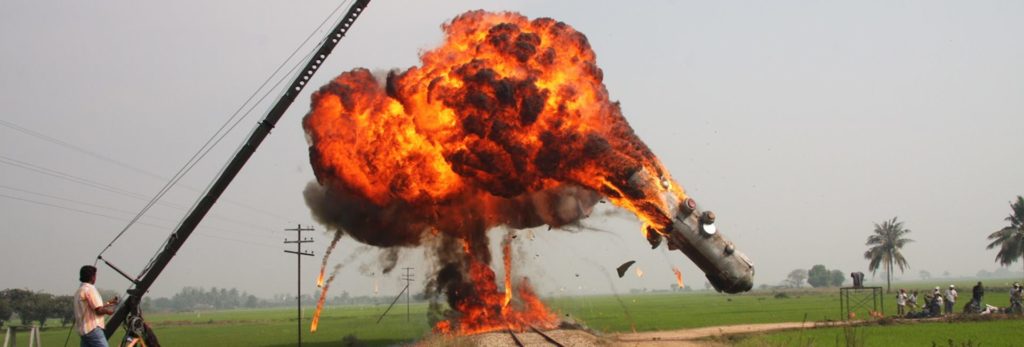
Genup: Who is your ideal customer?
Rachvin: We have a range of customers. We started off as production service, now we are pivoting. The last two years we knew that production service which are one of our core business is going to change. So we started also creating our own content. We’re becoming a content creator. We have 3 verticals —
Kulthep: So, we started off as productions service. Then because we’ve been doing a lot of TV commercials, so we started producing TV commercials as well. So, producing means you take on the entire project and you deliver the final project to the client. Like earlier, we were just part of the process. We were doing OEM, like you would do part of the process, and then the client will take the footage back and do whatever they do. And then they will deal and deliver it to the client.
And then we started the advertising and additional content work which we produce as well. Compare it to a phone brand right, so you were manufacturing chips for Samsung and now you become a company that manufactures your own brand.
And the third vertical we do is, we’ve started getting into content creation. So long-form content. Films and series. That’s what we’re doing now as well. And then we have an office in the US. So the office in US is also focusing mainly on creating feature films. They’re doing independent feature films.
And then we have an office in Poland. Poland is mainly focused on doing production service for the Eastern Europe market. Now we are getting into India. And that’s where the original content comes in play. Where we’re trying to cross-pollinate stories and content between Thailand and India and all.
So those are the main businesses, the verticals that we do-
Rachvin: So as for clients, there are a range of clients. For TV commercials, it’s the agencies and the final clients. For feature films, right now we’re trying with OTT platforms like Netflix These are the clients for the original content-
And when it comes to production service, it’s the producers themselves. So, we have a range of clients that we sort of approach.
Like OEM, basically we know how to put things together. So that’s what for the last 20 years was the common commonality of all this, is that we can produce whatever content it is, whatever format it is, whatever scale it is, we’re able to pull it together with the right people and the right crew in right sizes and the right prices. There are a lot of companies that we know that are very similar to us, but they will do only one line and that’s it.
So mostly their advertising people will do only advertising, film people will only do film-
They have their own targets.
Kulthep: If they do a series then they only specialize in series. If they do feature film then they only specialize in feature film.
So I think the way we are shaping ourselves, we’re becoming a mini studio in a way where we’re able to raise financing, we’re able to do projects, we’re able to work with the channels and the platforms to create content for them. So that’s that side.
Yeah, so these are the key differences between our company and a lot of other companies that we do three very different verticals. And the way we look at ourselves, we look at ourselves as content creators. We can create content of all different sizes and formats. Maybe advertising, maybe branded content, or long-form content.
But, for the production service side of it I think our clients are from the Indian sub-continent. They’ve always been our staple, our bread and butter.
Rachvin: And then COVID came, and we’re not sure what happens next with that. I mean we did our first, big Hollywood studio film. That was good. Earlier this year, before COVID.
We have done a lot of US films, but this is the biggest one we did that was a studio film.

Genup: So how do people find you? What marketing channels do you use?
Kulthep: I think in this business, it’s 90% word-of-mouth.
Rachvin: Somebody researches you; somebody will check with somebody they know. That’s literally how we grew for the first 15 years. We can always trace back to who mentioned us or who gave our reference.
Kulthep: I mean we’re also very active on social media and we’re on top of all the search engines too.
Rachvin: Exhibitions, trade shows. We go to all of them. But none of that actually result in any substantial business. We do get inquiries for small videos here and there, but for big projects are always referrals. I mean, even CBS came from a referral.
Kulthep: From somebody we shot… just two days shoot we did for somebody from Italy and then they recommended us to the big studio in the US.
Kulthep: We started international projects. We were doing the Indian sub-continent and the first international project we got (for Israel) was from an Indian company that was doing an Israeli project. And then Israel became the second biggest market for us.
But yeah, having very strong presence everywhere is critical and we continue to do that. It’s like let’s say, we go to Cannes. We’ve been going to Cannes for the last seven, eight years now. It took us, what almost five, six years until people said, “Okay these guys are serious. They’re still here. They’re not fly by night. They don’t come one year, disappear the other year.”
Rachvin: A lot of people go for a year or two and nothing happens, and they say, “Why are we wasting money.”
Kulthep: For us it’s long term. And we go to lot of film festivals and then eventually it’s like any other market. You kind of start knowing everybody and everybody knows you and then that’s how you grow your network and grow your business.
Rachvin: For film production, it’s such a different business because it’s not a recurring business. You go four years, nothing happens. Five years and suddenly there’s a guy, “Oh I have a project for Thailand. Can you guys do this?” If you’re not there, then they go to the next guy. You just happen to be there and catch them at the right time.
Kulthep: Yeah. So we’ve been attending the international circuit for the last 10, 15 years already that we’ve been going around the world and different places. And then I also work a lot with the government sector so that kind of helps. I’ll do a lot of work with the government side of things, especially for the policies, the filming policies of Thailand. We don’t make money from the government, but it puts your name out there. It helps. I’ve never got any direct business or anything out of doing this. I think more than that, we’ve been doing this for so long. We have very good local and international perspective. And that’s what I bring back into Thailand.
For example, I was on the committee that worked on the film incentive program. So the film incentive program is a program where if you come and shoot and spend more than 50 million Baht in Thailand, the government returns you 15% of your spending. So, I pushed for that for seven years before it happened. Finally, it did. So I was on the working committee that did that.
I enjoy the process of bringing things back and implementing them here. Like this whole COVID situation I was very actively involved in restarting, in getting the government to come up with a policy on how to restart the shoot again. Because they didn’t know. So, we had to go in as an industry leader and say, “All right, guys. Let’s design it this way and let’s start with 50 people. Let’s have a procedure in place.”
Genup: What were your initial hurdles when you started your business?
Rachvin: I guess in the beginning we didn’t know too many people in the business. So, it was tough because people didn’t want a new player. It was a very small industry So coming from outside, it was tough, people weren’t really helping us in any way. And competition was fierce because there were not too many players. Now It’s still fierce but in a different way.
The learning curve was tough because we’ve never done this before. We didn’t go to film school. We never did any of these things. We just started from scratch.
Kulthep: I mean nobody taught us anything. It was all self-learned, self-done, accounting procedures. How to collect money from them, how to deal with international clients and to ensure that you get paid by the end of it. I mean there’s so many cases where they go away and not pay you. It still happens today.
So a lot of those challenges I think. A lot of local crew did not want to work when we started with Indian production. They were just like, “Oh we heard bad things. We heard that they’re difficult, they change their minds all the time.”
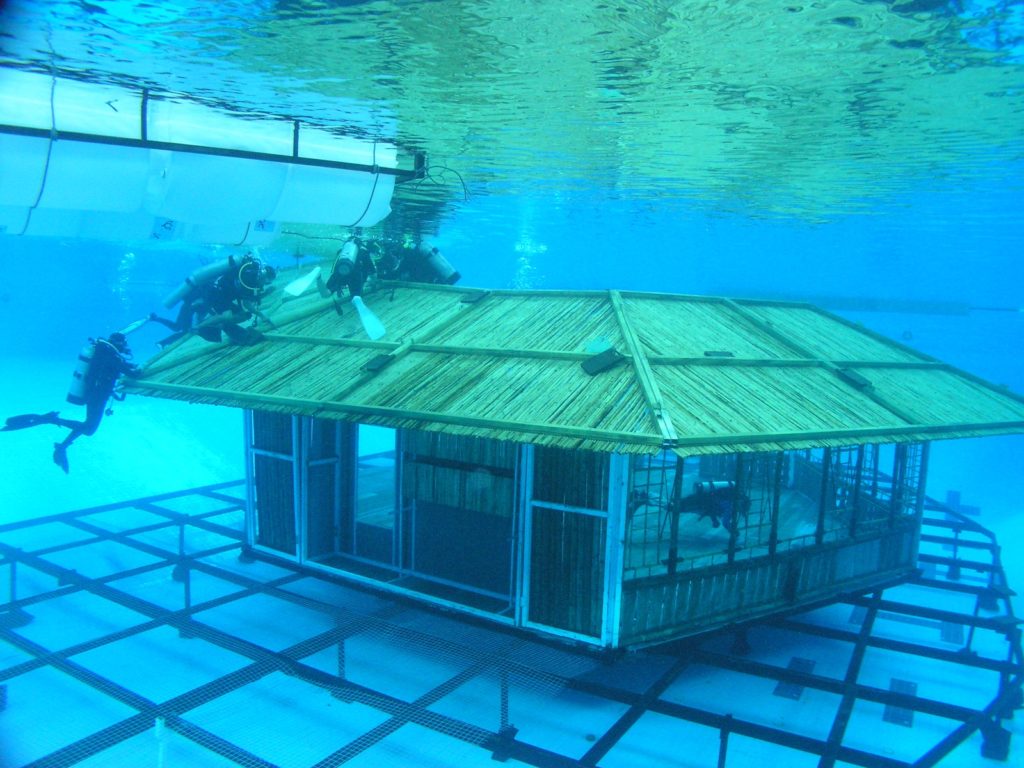
Genup: Do you have a memorable major mistake that you made, that you came back from?
Kulthep: That was this one shoot where we had to build an entire bar under water. That’s was till today the most difficult project we worked on. So a client came (he had shot with us a couple times before), to us and he said, “I have this project and we need to build a bar under water. Can you guys do it? And we said, “Okay let us figure it out.”
And we spoke to people. It had never been done… this scale has never been done in Thailand before. And after four, five days we went back to him and said, “Yeah we’ll do it.” And, we came with the costing which was half of what it was costing them in London to do it.
So, we put together… It was a very complex shoot where we had 12 actors under water at one
Rachvin: 500 people on set.Kulthep: Yeah, we had like 400, 500 crew on set just dealing with that thing. It was a huge, huge shoot. We got lights from four different countries because we didn’t have enough lights in Thailand to do under water, to ensure all of that. And then the day before the shoot, the entire pool got flooded with sand.
Because the Art Director went and made a sand flooring without being told to make a sand flooring. He covered it with some coating, and once we put the water in, the coating came off because of the chlorine in the water.
Rachvin: So the entire pool was filled with impurities and with sand, and the entire Israeli crew was already sitting here and it was going to turn into a major disaster.
Kulthep: And very expensive. Very, very, very expensive shoot. And at the end of the day if we didn’t deliver then it was all on us. But we were lucky. The client knew us well. He was a good guy and so we sat down with him and said, “Okay now, what’s next?” It wasn’t about, let’s start blaming. That’s what 80% of the people usually do. The first thing they will do is they will start blaming you. They try to think upon whose fault is it. I said, “Okay this is not the stage where we talk about whose fault it is. It happened. None of us planned it. None of us want this to happen. It’s happened now.”
And the Art Director came, he was still acting cocky. That was the first time we worked with him and the last time we worked with him. Because he came and he was like, “Nah, it’s not my fault.” So we pushed him aside and said, “Okay, let’s discuss it.”
It took us about five days to clean the pool.
Rachvin: Half a million liters of water in there and we could not simply drain the pool because the tile would break. The water is so heavy. When we had built the bar we built it outside and piece by piece, and we took it in with divers and assembled it.
Kulthep: I think the lesson learned is to stay calm during crisis. Work as a team. If you talk about problems, I mean those are the problems that happen on set. Where things go wrong. I mean literally imagine putting a factory together every day. This is how many people who don’t work with us, who are all new. Every day literally about 200, 300 people come together, shoot something for a minute or two, and then you disassemble the whole factory.
I mean logistically it seems simple enough to do it, but to do it right every single day. We need hundreds of people doing the right things at the right time to be able to get the output out. And the output is sometimes a few seconds a day, like fifteen seconds of footage a day.
Every day is different, it’s a whole different set of problems.
And that’s what we tell our crew, like the crew we work with. I say, “We’re in the business of dealing with problems. That’s our business, dealing with problems all day. So, first thing I need you to do is stay calm. And if there’s a problem you immediately think about the solution. Don’t think about why it happened, we’ll talk about why it happened later. At the end of the day. But at that moment switch your head into solving the problem.” And don’t say who’s responsible? Who’s going to pay for it? We’ll figure all that out. But just get this through first”
Rachvin: So, we always say, “what’s plan B? What’s plan C? What could go wrong? What if we go there to that location, and it’s not what it is?” Things like this happen all the time.
Kulthep: It was very funny, once we had this client that before working with us, he was going to work with another production company here. So that company sent in a picture of Erawan Waterfalls. But the picture he sent was a picture he found on the net or whatever, full of water, green, everything. And when the client arrived on shoot, it was dead in the middle of summer and there was no water.
So, the client arrives with 70 people, 80 people onto location and there’s no water. And they just turn around and were like, “What is this?”
Rachvin: Yeah, when people talk to us sometimes, they feel that we’re really expensive or whatever it is. But we do all that stuff. Like something like this should never happen. We will send somebody there first to scout. You know, the way location looks changes all the time, the color of the foliage changes, the theme changes. On paper, on video, on pictures, it looks different. So, we insist that the clients come and do pre-production. They say, “No it’s expensive, we don’t want to come for pre.” Especially Indians. They don’t want to come for pre-production.
But we insist they come for pre-production and you see for yourself because we can only imagine a certain thing. Right, we can’t imagine what you’re going to do with it. But at the end of the day, like I said, we have our own producers because we go into that details of production in every single element.

Genup: Where do you see your business five years from now?
Kulthep: I think the journey now takes us to the next step, like we said a couple years ago we embarked on producing original content.
Rachvin: We were just one day driving back and talking about that. If we didn’t start this two years ago, we would be in big trouble right now.
Kulthep: Yeah. So, I think that the structure of production service as a business has fundamentally changed from what it was 10 years ago, or 15 years ago, or even eight years or five years ago. The advertising landscape has also changed dramatically. The proliferation of online content, digital content has changed and the consumer behavior has drastically re-defined what the advertising business is.
Rachvin: And COVID has just sort of sped that up.
Kulthep: Yeah, in terms of the budgets, in terms of what a client is willing to spend and all of that. So production service will still be there, but the nature of the projects that we get is going to change.
The second part of the business is going to be the original content. And I think that’s where we’re going to be putting a lot of our focus into. And becoming a company that produces high quality content. So we have the division in the company, it’s called Benetone Films Original. That’s what we’re doing at the moment. Also, we are not looking at ourselves as just a Thai company. Of course, we’re here, we’re in Thailand. But our aim is a lot more regional at the moment, regional to global.
Our US office is also producing a lot of independent films. At the moment we have about four projects lined up in the US. We’ve done two already of those four and then this whole COVID thing happened. Anyway, we have Thai content that we’re going to be doing, we’ll be doing English language content and probably Hindi language content. Because we recognize that the consumer taste is changing, especially because of shows on Netflix like Money Heist is completely Spanish show, but audiences are everywhere around the world. So, it’s not about audiences wanting to watch only English language content anymore. It can be any good content.
A couple of years ago Thailand did not offer, or the region did not offer that platform where you could tell a story in that particular way. So most of the content that was coming out were the films that you see here, the soap operas were coming out of here. So that’s not the kind of content that our company is looking to be doing, we want to do more. We want to do bigger projects. And, projects that we can take to more for international audience. But originating out of this region. I think that’s how we are placing ourselves and that’s where we see ourselves in about five years’ time. Pivoting to more for original content company.
Genup : How do you stay motivated? What drives you?
Kulthep: What drives me is the fact that I get to do something different every day. We are constantly evolving; we are constantly looking out. I think the way I look at it we are in a business that requires constant change. Like whom would have ever thought four years or five years ago that there would be a market for 10-minute series? Or, a 20-minute series? It used to be 40 minutes. Everything was 40 or 50 minutes. And now it’s eight minutes, 10 minutes, 12 minutes kind of content. So, the landscape in which we operate changes so fast. And I think it’s keeping ahead of the curve and constantly understanding that we are doing right now is not going to be relevant two years from now, is something that drives me. That I always get to look at something different, look at what’s next.
Rachvin: We also in our business, get to meet a lot of different people and get to see a lot of new things. It’s never the same. Like he said, “Everything changes.”
We get to meet a lot of the top players in the industry all the time. Directors, producers, who come with a little bit of a different angle about producing content. It is very satisfying seeing something you’ve produced come back. Just seeing the commercial you’ve done go on air.
Millions of people see the stuff that we do. For us that is quite rewarding. It was our creation, we planned it and that scene happened as we intended. So that’s very exciting for us.
I remember very clearly, when we started off people were saying, “You can’t scale this business up.” Production business, you can’t scale it up. You need to be there all the time. And it is satisfying for us to see that we could scale it up. That was the fun part of it. And, then we were lucky it was a business that didn’t require a lot of capital to start off.
And that’s why we tell people that we were able to do what we do because of passion, we enjoy it. This is passion.
Kulthep: I think that’s very important. If you don’t have the passion, It becomes monotonous. It becomes mundane, it becomes boring. And I think if you’re excited with your job, with what you’re doing and you believe in it, I think that’s important.
Rachvin: Because it is also very, very stressful.
Kulthep: I mean for somebody to come in today to do what we do or, we talk about it sometimes, like if we had to start today, I don’t think we could. The market is very difficult. We were very lucky, touch wood, to be ahead of the curve. A lot of people are coming into the business today, a lot of people are starting off. But, just because of what we have done in the past, is why we are here today.
It’s just so much more competition now. So much more, and if you’re just starting, how do you start? How do you win the market? How do you go after the clients? The people we know today are people that have been doing business with us for 20 years, if somebody else is starting today and walking in and saying, “Hey come and do business with me,” versus somebody who’s been doing it for 20 years with us, how do you win that business away from it? We have made all these connections over the last 18, 20 years.

It would be the same if we were starting today and we had to compete with companies that have been around for so long, it’d be very tough to do-
Genup: Who do you admire? Any people, books, movies that motivate you?
Kulthep: Oh my God. Different things, different people inspire me in a different ways. I mean if it’s pure business and pure films then I enjoy the older films I think a lot more. All black and white, but when I grew up and when I started becoming more interested in films, everything from Stanley Kubrick’s to “Apocalypse Now” to “The Godfather “movies.
Those were what I consider the classics that cannot be made today anymore. Especially with the world being so politically correct. How do cut a neck of a horse and put it in bed? In today’s world you’d have animal cruelty organizations running after you. But I think the storytelling was very different back then, and I think those people who were able to make those kind of movies, I think inspired me in a lot of ways.
As for people and personalities, I think there are a lot of examples out there of entrepreneurs and people who’ve made it big. So you kind of study their journey. But if you break it down a notch to other businesspeople that I look up to, there are colleagues and friends of mine here that I’ve seen them grow along with me in their entrepreneurial businesses.
A simple example, like a friend of mine Anand, who runs Jagota, we kind of started together and he’s grown his company to a really successful company. So I look at different levels and people at different levels, and try to get inspiration from them and what they do, and how they do it. So, I guess there’s just not one.
Rachvin: I think Ridley Scott’s company is the kind of business model that I look at for films. They have multiple set-ups around Europe, and Japan, around America and China. And they do things very similar to us. A lot of content creation, basically long-form short-form music videos, but at a very high quality. We are sort of very, very small version of what they do, of course but from time-to-time we try to see what they’re doing and how they’re doing it.

Genup : What don’t you like about being an entrepreneur?
Rachvin: It’s a 24/7 challenge, it’s every day. We live the business and there’s no separation today in business and life. It’s hard. When you work all these hours and then go home, you start thinking about what will happen, how to pay salaries, how to mark up the project costs. We are responsible for the livelihood of so many people. We have to make sure things are safe on set etc. It is hard.
Kulthep: What’s tough about being an entrepreneur is you don’t get a downtime. Your work comes first. I mean obviously you try to do as much as possible. But it’s tough right? Especially running this business, it’s not an eight to five job and you can get your weekend off. It’s 24/7 because the shoots can happen any day, anytime. Sometimes it’s night, sometimes it’s day. Sometimes it’s tough to not get enough time with your family. That’s a big problem for me personally. But then that’s the time where work is good right? So, you have to try to balance it, you have to do work, but you still want to spend time with your family. Sometimes I got to be out of town for months where we’ll be shooting out somewhere. Or, sometimes I’m traveling four cities in one day. It’s a lot of different combinations and other things.
Also managing people. It gets tough. The quality of workforce is questionable at times here. You do deal with a lot of good people but sometimes you just you want to bang your head on the wall.
So that is to me gets quite challenging and irritating at times. Is just dealing with people. If you’re lucky and you have a whole bunch of great people with you, fine. But when you’re growing fast, and you cannot find good people, it becomes quite difficult.
Rachvin: That’s the hard part because there’s nobody helping you in term of innovating what to do, and it’s all you.
Kulthep: I mean you’ve got to look right; you’ve got to look everywhere. And as a good entrepreneur obviously you’ve got to constantly learn, you’ve got to constantly see what other people are doing. You’ve got to constantly get input from outside of your own universe.
And that’s more and more what we’re trying to do. We’re trying to see if we can put together let’s say a board of directors who are not from the business and bring in a completely different perspective. And that’s what we’ve been discussing a lot, learning a lot from other companies.
Rachvin: So that we can have different sets of opinions, a different form of opinion, which nowadays you need it. Early days there was no problem, but now you need people who have very different perspective than you.
Genup: What does success in life mean to you?
Rachvin; Family, kids. I’m blessed with kids; I think that’s important. Happy with that, happy to have been able to raise good kids. That’s important for me. Having good friends, family, parents, the normal stuff, those are what are satisfying.
Kulthep: I mean success is I think a combination of being able to do or achieve different part of the pie in what makes it the whole, right. A big part of that is obviously work, to be able to run a successful business where people look up to you and admire the company. To be able to build a brand that stands for something. I think we have a long way to go. I think we’ve come a long way, but we still have a long way to go because our ambitions are much higher.
So, part of what defines success is to be able to achieve what you set out to achieve in work, to be a company that is admired. I think that’s important. And the other part of it is obviously your family and your kids. That is a lot of who you’re working for, it’s not only about myself but eventually it’s the family that you’re working for as well. To ensure that they have a comfortable life, to ensure that you’re able to provide good things in life for them. And if I’m able to do both of that then I think that’s success.
And then along the way to be able to pass on the knowledge, to others in as well as outside our industry. That satisfies me in a lot of ways. I think that’s why I do a lot of outside stuff, like I give lectures at university, sometimes and I deal a lot with the government side of it. It’s not purely just to gain but also to be able to give.
For instance, I was proud to be part of the committee that was managing the rights for the boys who got stuck in the cave. I was the lead on managing the entire rights for them, ensuring that they get the best deal from the studio. I didn’t make a money out of it, nor was it time to make it. But I was able to structure a really good deal for them to ensure that they get the maximum money they can get for the story rights. So, things like that I really enjoy doing.
So, to build the company, being able to pass on the knowledge and to have a good family balance.

Genup: What advice would you give someone who was about to start on their entrepreneurial journey?
Kulthep: In this day and age especially, you should really study and understand fully what you’re getting into. The competition in ever industry is intense. I would suggest that whatever it is that you’re doing, understand your competition inside and out before you decide to do anything. Of course, you also need to have passion for it. You’ve got to be excited about it. You’ve got to enjoy it. All of that. But I mean, whatever business that you’re looking to do, understand what your competitors are doing, understand them inside-out.
Study them and then think about if you do get into it then what do you do different? Or how would you take what they’re doing and do it better. Because there’s so much competition and everything right now, that you’ve really got to understand what it is you’re trying to do.
Otherwise you’re just being a part of the noise out there, right? So how do you elevate up from the noise?
Rachvin: Exactly. Study your competition and then see if you can find a unique voice. There are so many things out there, so you need to know what your advantage is.
Kulthep: And then I think you’ve got to be able to adapt. I mean the idea that you started off with may change and may not be a part of your core business. So how do you adapt, change and be flexible? And don’t be stubborn and over-confident. Sometimes people say being cocky is good. It works for some people; it doesn’t work for some people.
Try to get as much knowledge as you can from people who are more experienced than you. Always try to find people who are more experienced, be friends with them, get them to pass on the knowledge to you because no matter what you think you know, you don’t know enough.
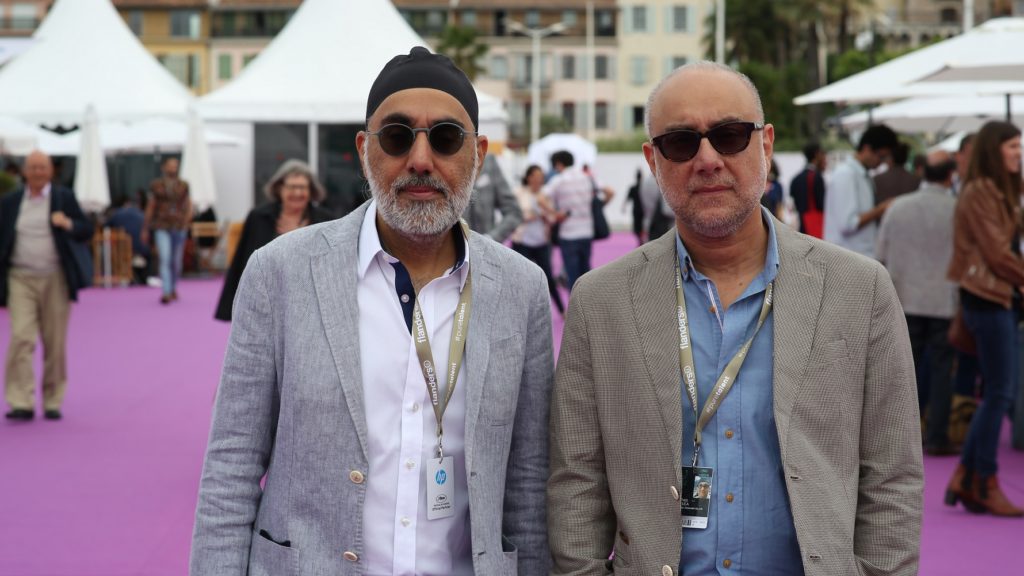
Rachvin: Surround yourself with people with good knowledge to help you through the journey, because there’s no one right path, right? Get a good board of directors together, I think that’s a really smart to do. If you can’t afford a board of directors, then go find good advisor before you start something. Learn from them.
Kulthep: I think there are enough people out there who want to pass on their wisdom. It’s a matter of reaching out to them and ensuring that they do pass on that piece of wisdom to you. I think that’s what people kind of overlook at times. They just think they know it all or are so confident about what they think that they’re going to be doing, but wisdom is wisdom. The older I get, the more I realize that if I had looked for those wisdom when I was a lot younger or when I started off the business I could be far ahead than where I am today. There’s so much knowledge out there, and so much wisdom out there, latch onto to it if you can.
Genup: Where can people find you? What’s your website and social media accounts?
Kulthep: Our website is benetonefilms.com and we’re on all social media as well.
Genup: Rachvin and Kulthep, thank you so much!
Rachvin: Welcome!
Kulthep: Thank you!

Related posts
Today's pick
Hot topics
Welcome to Generation Upstart
It starts with an idea — a fusion of thoughts and experiences, a blending of desires and dreams. Bursts of electricity fueled with faith, love and creativity leap across synapses generating the necessary expression to give it real form and substance. Sometimes, an entrepreneur’s call…
Careerlist: Never Waste a Crisis
According to Michael Scissons, the most important thing you can do to maximize your chance of entrepreneurial success is to build your tribe. Start as early as possible, trimming and pruning like a patient gardener, while continuing to add value to the network. For these…
RingZero: On Employee Satisfaction and Success
Great people make the great teams that make the great workplaces, and Mr. Asmat Yousri is a big believer in people. After all, he has been at this since 1996. An ex-banker, he saw no obstacles transitioning from a corporate position to an entrepreneur. In…



